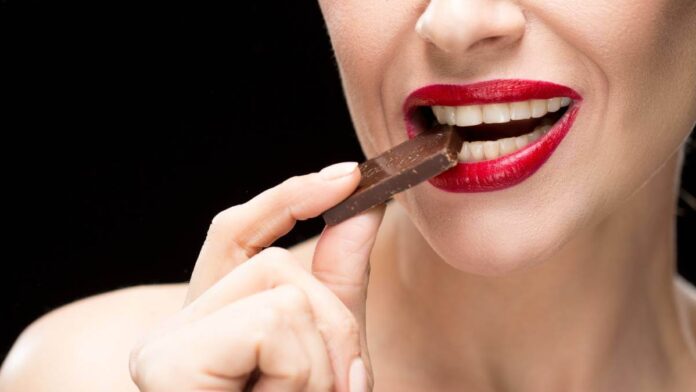Associate Professor Said Ajlouni, Associate Professor Senaka Ranadheera, Dr Kristy DiGiacomo and Wenan Cai
It was predicted that Australians would spent $2.05 billion on hot cross buns, Easter eggs and other special foods this Easter, an increase of $400 million from 2023.

Despite claims that some chocolate is less healthy due to its sugar content and ultra-processed ingredients (including emulsifiers, preservatives and processing aids), there are some proven health benefits like a positive impact on mood especially when enjoying the types that are higher in cocoa and minimally processed during manufacturing.
Chocolate, particularly dark chocolate, is rich in antioxidants that help fight free radicals, a type of unstable molecule that is made during normal cell metabolism and can damage our body’s cells, causing illness and ageing.
Although it’s not widely known, chocolate is also a fermented food, where certain bacteria and yeasts help to achieve flavour development in chocolate’s raw ingredients.
These microorganisms are like secret helpers for making high-quality chocolate.
Our latest research is focused on how chocolate reacts with our gut microbiota and probiotics – the helpful microorganisms in food – and how these all work together to boost gut health.
Healthy gut microbiota and probiotics
Our gut microbiota consists of billions of microorganisms, mainly in the colon. These microorganisms perform many vital functions in the body, for example by supporting the immune system, vitamin B and K production and fibrous food fermentation.
Research indicates that diet is one of the main factors that affect our microbiota’s function and composition. This is of course because what we eat also feeds these microorganisms. Fermented foods, some types of fibre and probiotics are helpful in boosting beneficial types of gut microbes.

Probiotics are live microorganisms like lactic acid bacteria found in food as a result of its manufacture (for example in yoghurt) or are added as a supplement.
When consumed in sufficient numbers they deliver health benefits by supporting the growth of the resident beneficial gut bacteria and suppressing the growth of damaging types like E. coli.
Is dark chocolate better when it comes to gut health?
Research indicates dark chocolate has more health-promoting properties. A recent study in healthy humans who consumed 85 per cent dark chocolate showed a positive influence on gut microbiota and their ability to restructure the diversity and abundance of gut bacteria.
This appears to be because cocoa acts as a prebiotic, which is not digested until it reaches the large intestine, where it supports the growth of beneficial bacteria.
Our latest study looked at the effects of adding probiotics (live bacteria) to chocolate. We found that both probiotic enriched dark (with 70 per cent cocoa) and milk chocolate (with 45 per cent cocoa) supported the production of healthier digestive by-products (also known as postbiotics) in the colon by both the probiotics and the resident gut microbiota.
For example, 70 per cent chocolate enriched with probiotics promoted the production of certain beneficial fatty acids known as isobutyric and isovaleric acids, while 45 per cent regular milk chocolate supported the production of propionic acid in our model digestive system, which mimicked the normal digestion process.
These fatty acids provide various benefits, for example propionic acid can regulate feeling full (satiety) and energy homeostasis, a method of controlling energy balance in the body.

Interestingly, the same study showed that certain probiotics, for example Lactobacillus sanfranciscensis and L. casei, were able to produce higher vitamin B12 levels (another important by-product that can only be synthesised by our gut microbiota) when incorporated in 45 per cent chocolate but not 70 per cent chocolate.
In other words, regular milk chocolate seems beneficial in promoting vitamin B12 production in the presence of probiotics.
However, this is an area requiring further research because biosynthesis of vitamin B12 in the stomach and absorption by the intestines requires some intrinsic human factors and our study was performed in an artificial model system.
It’s also worth noting that different probiotic strains have a variety of beneficial functions. While some strains may be effective in supporting digestive health, others may assist in modulating the body’s immunity.
So, we need to investigate different probiotic strains in chocolate to test how well they can achieve diverse health benefits. Keeping probiotics alive in chocolate during manufacturing, storage and the journey through the digestion process is also a challenge that requires further research.
How to choose gut-healthy chocolates
If you are thinking of gut-healthy chocolates and how you can improve your gut health overall, here’s what you can do:
- Probiotic chocolates are available in certain parts of the world and in Australia there are some chocolates enriched with probiotics, especially nutraceutical products. But their effectiveness cannot be predicted without laboratory assessments, so do read the labels and find further information by referring to the manufacturer’s websites or contacting them

- Look for information on the chocolate’s manufacturing process. Some products contain various ingredients and sweeteners that are ultra-processed, which is not the healthiest option. Reading labels can be handy here. Go for trusted manufacturers and products with minimal processing. Locally produced could be more suitable as chocolate is highly vulnerable to food fraud.
- Aim for dark chocolates with at least 70 per cent cocoa content as they contain less sugar. However, enjoying some milk chocolate could still have benefits. Regardless, eat any chocolate in moderation.
- A bit of extra exercise, perhaps an evening walk, bike ride or hike with your family and friends is always beneficial. This could help you overcome some of the negative effects of extra chocolates and big festive meals.
This article was first published on Pursuit. Read the original article.
How much chocolate do you eat? Would this story change your habits? Why not share your opinion in the comments section below?
Also read: Chocolate and Raspberry Brownies



